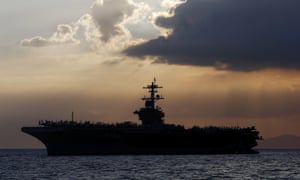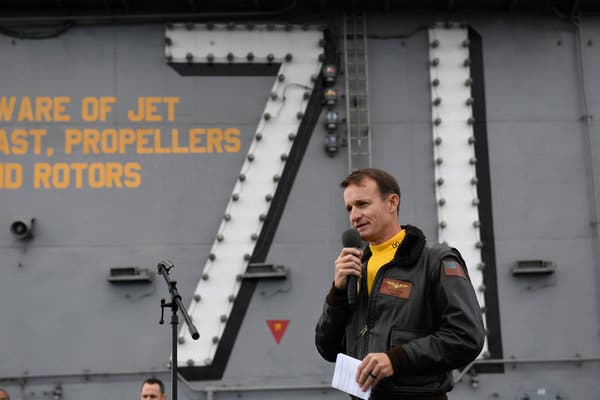Carrier with thousands onboard is docked in Guam, which is struggling to handle local caseload of Covid-19 infections

The captain of a US aircraft carrier, with 5,000 people onboard, including an unconfirmed number who have tested positive for Covid-19, has called for help to save the lives of his sailors.
The US aircraft carrier Theodore Roosevelt was in the Pacific when the navy reported its first coronavirus case a week ago. It has since pulled into port in Guam, a US island territory in the western Pacific.
A four-page letter, written by the ship’s captain, describes a bleak situation onboard the nuclear-powered carrier as more sailors test positive for the virus.
Captain Brett Crozier, the ship’s commanding officer, wrote that the carrier lacked enough quarantine and isolation facilities and warned the current strategy would slow but fail to eradicate the highly contagious respiratory virus.
In the letter dated Monday, he called for “decisive action” and removing over 4,000 sailors from the ship and isolating them. Along with the ship’s crew, naval aviators and others serve aboard the Roosevelt.
“We are not at war. Sailors do not need to die. If we do not act now, we are failing to properly take care of our most trusted asset - our sailors,” Crozier wrote.
US officials, speaking on condition of anonymity, told Reuters that nearly 80 people aboard the ship had tested positive for the coronavirus, a number likely to increase as all personnel on the ship are tested.

The captain of a US aircraft carrier, with 5,000 people onboard, including an unconfirmed number who have tested positive for Covid-19, has called for help to save the lives of his sailors.
The US aircraft carrier Theodore Roosevelt was in the Pacific when the navy reported its first coronavirus case a week ago. It has since pulled into port in Guam, a US island territory in the western Pacific.
A four-page letter, written by the ship’s captain, describes a bleak situation onboard the nuclear-powered carrier as more sailors test positive for the virus.
Captain Brett Crozier, the ship’s commanding officer, wrote that the carrier lacked enough quarantine and isolation facilities and warned the current strategy would slow but fail to eradicate the highly contagious respiratory virus.
In the letter dated Monday, he called for “decisive action” and removing over 4,000 sailors from the ship and isolating them. Along with the ship’s crew, naval aviators and others serve aboard the Roosevelt.
“We are not at war. Sailors do not need to die. If we do not act now, we are failing to properly take care of our most trusted asset - our sailors,” Crozier wrote.
US officials, speaking on condition of anonymity, told Reuters that nearly 80 people aboard the ship had tested positive for the coronavirus, a number likely to increase as all personnel on the ship are tested.


